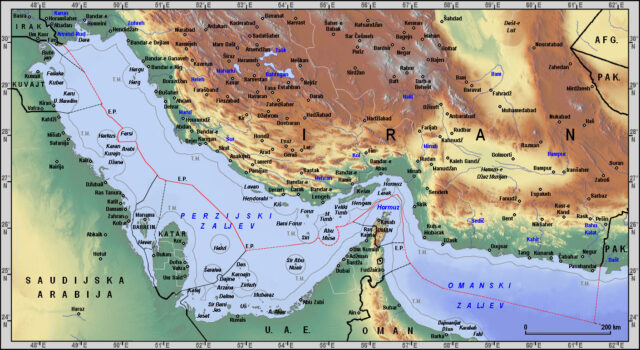
Persian Files ISSN 2975-0598 Volume 14 Issue 2
Author: Silvia Boltuc
In a bid to forge stronger ties and promote regional cooperation, Iran’s Foreign Minister, Hossein Amir-Abdollahian, recently embarked on a three-day diplomatic tour of key Arab nations in the Persian Gulf. With a focus on economic collaboration, his visit to Qatar, the United Arab Emirates, Kuwait, and Oman marked a significant step towards enhancing relations with Iran’s southern Arab neighbours.
During his trip, Amir-Abdollahian engaged in high-level discussions with key leaders, including the Emir of Qatar, the Prime Minister of the United Arab Emirates, the Prime Minister of Kuwait, and the Minister of Foreign Affairs of Oman. Furthermore, he met with the top negotiator of the Yemeni National Salvation Government and held talks with his counterparts in each visited country.
Information Background
In a press statement at the conclusion of his regional tour, Amir-Abdollahian expressed optimism about the future prospects of collaboration, stating, “Within the framework of economic and commercial cooperation, we will have very positive developments for our nation and the people of these four countries.”
He highlighted the importance Iran places on bilateral issues and emphasised discussions centred on removing obstacles and fostering cooperation in various domains, such as economy, trade, tourism, science, technology, and other areas of mutual interest.
Furthermore, the idea of establishing a forum for dialogue and regional cooperation among the northern and southern Gulf littoral states was proposed during the meetings and received unanimous approval from all four countries visited.
Amir-Abdollahian also revealed that in September, the initiative put forth by the UN Secretary-General, António Guterres, will lead to the convening of the first meeting of foreign ministers from eight neighbouring countries, including Iran, Iraq, and the nations situated along the southern shores of the Persian Gulf. The minister welcomed this initiative as a positive development.
Notably, during his visit, Iran and the United Arab Emirates signed an agreement aimed at expanding air travel between the two countries and creating opportunities for increased trade and tourism.
The Persian Gulf: A Geopolitical Scenarios
As the geopolitical landscape undergoes significant shifts, Iran finds itself in a critical position to expand its trade relations with neighbouring countries. Despite enduring the harsh impact of Western sanctions, Tehran’s resilient government has managed to overcome many challenges.
However, with the recent escalation of the Ukraine conflict and the growing confrontation between the West and Russia, Iran has recognised the need to pursue a foreign policy that prioritises enhancing relations with key regional players.
In this scenario, Tehran strategically focuses on strengthening economic ties and fostering trade partnerships with its neighbours in the Persian Gulf. By diversifying its trade channels, Iran aims to mitigate the impact of sanctions and bolster its economic stability. Through increased cooperation with regional countries, the Islamic Republic tries to tap into the immense potential for trade, investment, and mutual economic growth in the Persian Gulf region.
Following the normalisation of relations with Saudi Arabia, Iran finds itself presented with a unique opportunity to position itself more effectively in the Persian Gulf. With tensions gradually easing between the two regional powers, there is a growing possibility of promoting deeper engagement and strategic cooperation among local actors.
In this situation, Iran is taking active steps to increase its diplomatic relations with Saudi Arabia and other influential countries in the area. By fostering mutual understanding and addressing shared concerns, Tehran seeks to build trust and create a conducive environment for cooperation on various fronts, including security, energy, and regional stability.
Strategic partnerships with Gulf countries would enable Iran to play a more influential role in shaping the dynamics of the Persian Gulf, potentially leading to joint efforts to address common challenges and contrasting the U.S. influence.
Additionally, Iran’s strategic location permits it to use its land as a logistics hub to link the Arab Gulf states to Central Asia and the Russian Federation. Recognising the shifting dynamics and swinging relations between the United States and the Gulf monarchies, particularly under the Biden administration, Tehran sees an opportunity to diversify regional actors and create an alternative bloc in Eurasia that can counterbalance NATO and the West.
By enhancing cooperation with Russia and China, two major global powers with their own interests in the region, Iran aims to create a solid foundation for a Eurasian bloc that can challenge the dominance of Western influence in the Gulf and broader Eurasian region.
Moreover, fostering economic and diplomatic relationships with Russia and China, brings Iran into their extensive networks, resources, and markets. This collaboration opens up avenues for increased trade, investment, and technological exchanges, allowing Tehran to reduce its reliance on Western partners and assert itself as a vital player in the evolving Eurasian landscape.
Additionally, the growing dissatisfaction among some Gulf monarchies with the United States, coupled with Iran’s efforts to promote regional stability, positions Tehran as a potential mediator and facilitator in resolving regional conflicts. By presenting itself as a reliable and neutral actor, Iran can attract support and participation from various countries, thereby consolidating its influence and expanding its role as a key player in the Gulf’s geopolitical dynamics.
Do you like SpecialEurasia reports and analyses? Has our groundbreaking research empowered you or your team? Now is your chance to be a part of our mission! Join us in advancing independent reporting and unlocking the secrets of Eurasia’s complex geopolitical landscape. Whether through a one-time contribution or a monthly/yearly donation, your support will fuel our relentless pursuit of knowledge and understanding. Together, let’s pave the way for a brighter future. DONATE NOW and secure your place in shaping the geopolitical narrative.



